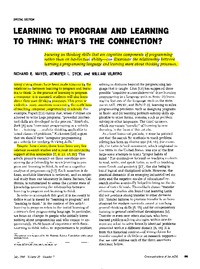Learning to program and learning to think: what's the connection?Erstpublikation in: Communications of the ACM, Volume 29 Issue 7, July 1986, Pages 605-610
Publikationsdatum:
|
 |
 Diese Seite wurde seit 5 Jahren inhaltlich nicht mehr aktualisiert.
Unter Umständen ist sie nicht mehr aktuell.
Diese Seite wurde seit 5 Jahren inhaltlich nicht mehr aktualisiert.
Unter Umständen ist sie nicht mehr aktuell.
 Zusammenfassungen
Zusammenfassungen
Focusing on thinking skills that are cognitive components of programming—rather than on intellectual ability—can illuminate the relationship between learning a programming language and learning more about thinking processes.
Von Richard E. Mayer, Jennifer L. Dyck, William Vilberg im Text Learning to program and learning to think: what's the connection? (1986)  Dieser wissenschaftliche Zeitschriftenartikel erwähnt ...
Dieser wissenschaftliche Zeitschriftenartikel erwähnt ...
 Personen KB IB clear | Lyle E. Bourne , Douglas H. Clements , Henry Gorman , Dominic F. Gullo , D. Midian Kurland , Roy Pea | ||||||||||||||||||||||||||||||||||||
 Aussagen KB IB clear | Problemlöseargument: Informatikkenntnisse helfen auch beim Lösen von Problemen ausserhalb der Informatikproblem solving argument: knowledge in computer science fosters problem solving | ||||||||||||||||||||||||||||||||||||
 Begriffe KB IB clear |  LOGO (Programmiersprache) LOGO (Programmiersprache) LOGO (programming language) LOGO (programming language)
| ||||||||||||||||||||||||||||||||||||
 Texte |
|
 Zitationsgraph
Zitationsgraph
 Zitationsgraph (Beta-Test mit vis.js)
Zitationsgraph (Beta-Test mit vis.js)
 2 Erwähnungen
2 Erwähnungen 
- Programming Language/Problem-Solving Research - A Review of Relevant Issues (David B. Palumbo) (1990)


- Koli Calling 2006 - 6th Baltic Sea Conference on Computing Education Research, Koli Calling, Baltic Sea '06, Koli, Joensuu, Finland, November 9-12, 2006 (Anders Berglund, Mattias Wiggberg) (2006)
- An objective comparison of languages for teaching introductory programming (Linda Mannila, Michael de Raadt) (2006)


- An objective comparison of languages for teaching introductory programming (Linda Mannila, Michael de Raadt) (2006)
 Anderswo finden
Anderswo finden
 Volltext dieses Dokuments
Volltext dieses Dokuments
 |  Learning to program and learning to think: what's the connection?: Artikel als Volltext ( Learning to program and learning to think: what's the connection?: Artikel als Volltext ( : :  , 693 kByte; , 693 kByte;  : :  2020-11-28) 2020-11-28) |
 Anderswo suchen
Anderswo suchen 
 Beat und dieser wissenschaftliche Zeitschriftenartikel
Beat und dieser wissenschaftliche Zeitschriftenartikel
Beat hat Dieser wissenschaftliche Zeitschriftenartikel während seiner Zeit am Institut für Medien und Schule (IMS) ins Biblionetz aufgenommen. Beat besitzt kein physisches, aber ein digitales Exemplar. Eine digitale Version ist auf dem Internet verfügbar (s.o.). Aufgrund der wenigen Einträge im Biblionetz scheint er es nicht wirklich gelesen zu haben. Es gibt bisher auch nur wenige Objekte im Biblionetz, die dieses Werk zitieren.











 Biblionetz-History
Biblionetz-History